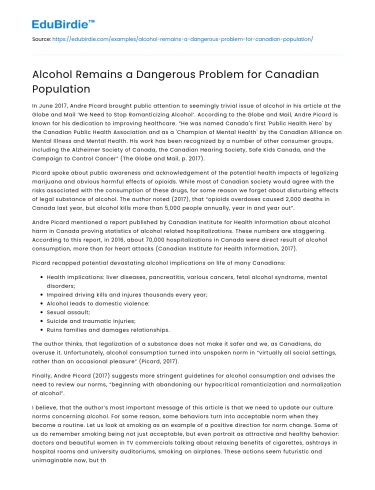In June 2017, Andre Picard brought public attention to seemingly trivial issue of alcohol in his article at the Globe and Mail ‘We Need to Stop Romanticizing Alcohol’. According to the Globe and Mail, Andre Picard is known for his dedication to improving healthcare. “He was named Canada's first 'Public Health Hero' by the Canadian Public Health Association and as a 'Champion of Mental Health' by the Canadian Alliance on Mental Illness and Mental Health. His work has been recognized by a number of other consumer groups, including the Alzheimer Society of Canada, the Canadian Hearing Society, Safe Kids Canada, and the Campaign to Control Cancer” (The Globe and Mail, p. 2017).
Picard spoke about public awareness and acknowledgement of the potential health impacts of legalizing marijuana and obvious harmful effects of opioids. While most of Canadian society would agree with the risks associated with the consumption of these drugs, for some reason we forget about disturbing effects of legal substance of alcohol. The author noted (2017), that “opioids overdoses caused 2,000 deaths in Canada last year, but alcohol kills more than 5,000 people annually, year in and year out”.
Save your time!
We can take care of your essay
- Proper editing and formatting
- Free revision, title page, and bibliography
- Flexible prices and money-back guarantee
Andre Picard mentioned a report published by Canadian Institute for Health Information about alcohol harm in Canada proving statistics of alcohol related hospitalizations. These numbers are staggering. According to this report, in 2016, about 70,000 hospitalizations in Canada were direct result of alcohol consumption, more than for heart attacks (Canadian Institute for Health Information, 2017).
Picard recapped potential devastating alcohol implications on life of many Canadians:
- Health implications: liver diseases, pancreatitis, various cancers, fetal alcohol syndrome, mental disorders;
- Impaired driving kills and injures thousands every year;
- Alcohol leads to domestic violence:
- Sexual assault;
- Suicide and traumatic injuries;
- Ruins families and damages relationships.
The author thinks, that legalization of a substance does not make it safer and we, as Canadians, do overuse it. Unfortunately, alcohol consumption turned into unspoken norm in “virtually all social settings, rather than an occasional pleasure” (Picard, 2017).
Finally, Andre Picard (2017) suggests more stringent guidelines for alcohol consumption and advises the need to review our norms, “beginning with abandoning our hypocritical romanticization and normalization of alcohol”.
I believe, that the author’s most important message of this article is that we need to update our culture norms concerning alcohol. For some reason, some behaviors turn into acceptable norm when they become a routine. Let us look at smoking as an example of a positive direction for norm change. Some of us do remember smoking being not just acceptable, but even portrait as attractive and healthy behavior: doctors and beautiful women in TV commercials talking about relaxing benefits of cigarettes, ashtrays in hospital rooms and university auditoriums, smoking on airplanes. These actions seem futuristic and unimaginable now, but they were very real. It took us a long time, dozens and dozens of years to change our perception of smoking. But we see, that it is possible – smoking is illegal in most public areas in Canada. Our cultural norm changed, and smoking is no longer considered to be an acceptable behavior because of it.
We need to change our cultural norm and perception of alcohol consumption. Now we drink because we are happy, sad, lonely, ecstatic, devastated, to keep a company, to celebrate, to support, to protest. We need to break this causality and take the alcohol out of the equation. It would be ideal if we could substitute alcohol consumption as a reaction to any situation with an alternative healthy behavior: a lengthy walk, gym exercise, book reading, meditation or may be just having a glass of plain water instead. It is hard to underestimate the importance of such change considering all devastating effects of alcohol. According to Centers for Disease Control and Prevention, alcohol consumption associated with various short term and long-term health risks. Such risks include, but not limited to injuries, violence, risky behaviors, alcohol poisoning, miscarriage, high blood pressure, heart disease, cancers, cognitive and mental health problems, social problems. (Centers for Disease Control and Prevention, n.d.)
There is a need in public policy change to influence the change in cultural norm of alcohol consumption. This policy change should be activated on all the levels of health promotion and disease prevention. As per Canadian Institute for Health Information (2017), policies geared toward minimizing negative alcohol effects could include various marketing regulations and enforcement, raising awareness through warning labels on alcohol bottles, legal drinking age legislation and enforcement, licensing suspensions in cases of violations (Canadian Institute for Health Information, 2017).
To sum up, we, as Canadian society, should be honest with ourselves and realize our overuse of alcohol and alcohol impact on our everyday life. It might take us years, but we need to put emphasis on development of new strategies that will help us to become a healthier happier society. Such complex policy and norm change will require a collaboration of professionals from many different disciplines, government and private sectors. It is a long road, but we need to start walking it, we do owe this to ourselves and our future generations.
References
- Canadian Institute for Health Information. (2017). Alcohol Harm in Canada. Retrieved October 2017, from Canadian Institute for Health Information: https://www.cihi.ca/sites/default/files/document/report-alcohol-hospitalizations-en-web.pdf
- Centers for Disease Control and Prevention. (n.d.). Fact Sheets - Alcohol Use and Your Health. Retrieved November 2017, from Centers for Disease Control and Prevention: https://www.cdc.gov/alcohol/fact-sheets/alcohol-use.htm
- Picard, A. (2017, June 27). We Need to Stop Romanticizing Alcohol. Retrieved October 2017, from theglobalmail.com: https://beta.theglobeandmail.com/opinion/we-need-to-stop-romanticizing-alcohol/
- The Globe and Mail. (2017). Retrieved October 2017, from The Globe and Mail: https://beta.theglobeandmail.com/authors/andre-picard/






 Stuck on your essay?
Stuck on your essay?

